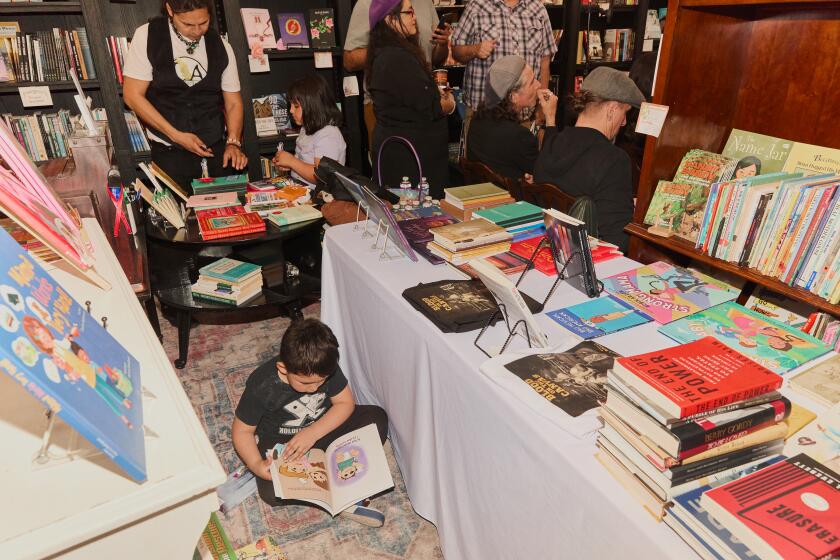Writer-Literary Patron Lived Out His Fantasies
George Plimpton, the urbane and eclectic writer and editor who in wry books like “Paper Lion” described his experiences as an amateur player in professional sports, music and other specialized fields, died Thursday night. He was 76.
A founding editor of the Paris Review literary magazine in 1953, Plimpton published and befriended many of the great writers of his day, including Ernest Hemingway, John Updike and Philip Roth.
He died at his home in New York City, a townhouse on East 72 Street upstairs from the magazine’s office. The cause of death was not announced, but friends said he had a history of heart problems.
“George had a rare gift,” writer Norman Mailer, a friend of Plimpton’s, said Friday. “He was so open to life and all of its new and unexpected situations.”
Having played character roles in a number of films, Plimpton was preparing for a trip to Cuba, where he was to have performed in a play based on Hemingway’s “A Movable Feast,” said Robert B. Silvers, co-editor of the New York Review of Books.
Silvers and Plimpton had been friends for more than 50 years and dined together early this week. At the time, Plimpton seemed to be in good health, Silvers said. “George was a man of immense natural charm, with a curiosity about many things and a tremendous sense of adventure,” Silvers said. “He was the ringmaster of the Paris Review. He found backing; he recruited writers to contribute and young people to work for the magazine.”
A native of New York City, Plimpton spoke with a patrician accent and, at 6 feet 4, he towered over most people.
Friends compared him to Walter Mitty, the literary character whose vivid imagination didn’t fit with his everyday life. The difference was that Plimpton acted out his fantasies, portraying himself as a comic figure in each story he wrote. What he lacked in professional prowess in his endeavors, he made up for with trenchant good humor.
Among his dreams fulfilled: He pitched in an exhibition game against All-Star baseball players at Yankee Stadium; golfed in Pro-Am tournaments; got onto the basketball court with the Boston Celtics and into the boxing ring with former light-heavyweight champion Archie Moore; and played goalie for the Boston Bruins and the Edmonton Oilers hockey teams.
He also performed a flying trapeze act with the Clyde Beatty-Cole Bros. Circus, tried to tame a lion, performed as a clown, and played percussion with the New York Philharmonic.
The latter prompted conductor Leonard Bernstein to say, “He did very well for an amateur, but then ... that’s his profession, isn’t it?”
Most famously, Plimpton took the field as a third-string rookie quarterback for the Detroit Lions, writing about it in “Paper Lion,” which was made into a 1968 movie starring Alan Alda as Plimpton.
The book came about when Plimpton, writing for Sports Illustrated magazine, had an idea for a first-person story: Play on a professional football team incognito and then write about it. He got the Lions to agree to it, but his cover was blown almost immediately. The best-selling book wittily portrayed the grunt and grit of a major football team.
“I ran one series in an intrasquad scrimmage and lost 34 yards,” Plimpton recalled at a team reunion held last weekend in celebration of the 40th anniversary of the publication of “Paper Lion.”
Plimpton wrote other memorable stories for Sports Illustrated, including a 1985 April Fool’s Day piece in which he created Sidd Finch, a former Tibetan monk who supposedly could throw a fastball at 168 mph.
Some duped readers of the magazine weren’t very pleased, Plimpton later said with some glee, but it remains one of the best jokes in baseball. Plimpton eventually turned the episode into a book.
But among writers, Plimpton was treasured most for his lasting relationship to the Paris Review.
“It’s a very honorable thing, to have a literary magazine,” writer Mona Simpson told The Times on Friday. She said the magazine, on which she worked with Plimpton for six years and which later printed excerpts from several of her novels, gave many new writers a chance.
Of all his passionate interests, Simpson said, “unquestionably the Paris Review was the most important thing to him.”
A quarterly with a small circulation, the Paris Review became well-known for its “Writers at Work” feature. Plimpton wrote a number of them, most memorably a 1959 interview with Hemingway.
He often recounted how he met Hemingway in the bookstore of the Ritz Hotel in Paris, where he noticed the famous author flipping through an issue of the Paris Review. He went bravely up to him and suggested his idea for an interview about writing, and Hemingway agreed.
As with many of his interview subjects, Plimpton became a life-long friend of the author, although Plimpton recalled that the interview didn’t go very well.
“I had a terrible experience with him,” Plimpton told National Public Radio’s Jacki Lyden last August. “I asked him about the high incidence of birds when characters in his books were making love, and he got very angry and he said, ‘So you think you can do better?’
“I mean, I thought he was going to slug me.”
Author Jean Stein told The Times on Friday that the interviews “are the main document for anyone interested in being a writer.”
Stein and Plimpton worked together on several books, including “Edie: American Girl,” which was about Andy Warhol groupie Edie Sedgwick. “He’s done so much for young writers,” Stein said.
Paris Review was either first or among the first to publish dozens of writers who later became well known, including William Styron, Jay McInerney and Rick Moody.
The magazine, which began operations in a Paris atelier of one of its founders, Peter Matthiessen, is scheduled to celebrate its 50th anniversary at a party in New York City on Oct. 14.
“Just two days ago, he was picking the color scheme for the fall issue,” Daniel Kunitz, a former managing editor of Paris Review, said Friday.
“He would usually discover a new writer in the slush file, the pile of unsolicited manuscripts.”
Kunitz said Plimpton’s favorite haunt was Elaine’s, a restaurant on the Upper East Side where writers gather.
“He would frequently come down in the morning barefoot, wearing a pair of khaki pants and white button-down shirt, untucked of course,” Kunitz said. “He’d prop his feet up and get to work, talk to everybody. He would spend lots of time down there, talking to the staff.”
Of late, Plimpton was seen dashing around New York City from one literary gathering to another.
On a typical night this month, he started at a book-signing party for former Secretary of State Madeleine Albright at the Four Seasons restaurant and went straight to a book publishers’ party at Gracie Mansion, where Mayor Michael R. Bloomberg and TV anchorman Dan Rather were among the other familiar faces in the room.
Over the years, Plimpton appeared in numerous films, mostly in minor roles or cameos, including alongside John Wayne as a gunman in Howard Hawks’ “Rio Lobo” (1970), as a well-wisher in “The Bonfire of the Vanities” (1990), as an inept psychiatrist in “Good Will Hunting” (1997), and playing Horace Whigham in “Reds” (1981). He also appeared on television, often playing himself. He lent his voice to the animated TV show “The Simpsons.”
A devoted bird watcher, Plimpton recently trekked by SUV into the Santa Lucia Mountains on California’s Central Coast, hoping to fulfill another lifelong dream: to see a condor.
In one of his last published pieces, he wrote about his first sighting of a condor for the Sept. 9 Outdoors section of The Times. He said that when he spotted the rare bird in flight for a few seconds, he was exhilarated not just by the sight of the condor, but by “ the efforts of humans to restore a species so grievously brought to near-extinction.”
Last spring Plimpton signed a $750,000 book contract with Little, Brown to write his memoirs.
“I have a lot of life to go, but now is the time to think about it and put something together,” he said in an interview with Associated Press last month.
George Ames Plimpton was born March 18, 1927. His father was a wealthy corporate lawyer and diplomat who served as deputy U.S. representative to the United Nations in the 1960s. Plimpton once told the New York Post that he had a “perfectly pleasant, non-unhappy childhood.”
He attended Phillips Exeter Academy in New Hampshire and Harvard University, where he edited the Harvard Lampoon. But a stint in the Army from 1945 to 1948 -- for a time, he drove a tank in Italy -- interrupted his education. He finally got his degree from Harvard in 1950 and went on to get a bachelor’s and master’s from King’s College, Cambridge.
It was while visiting Paris on a break from Cambridge that he met with friends Harold L. Humes and Matthiessen with the idea of launching a literary magazine to publish talented but often unknown writers. Plimpton became the publication’s first editor. Among the writers to first appear in the magazine were Terry Southern, Roth and Irvin Faust.
Returning to the U.S. after Cambridge, Plimpton continued with the Paris Review and wrote books and articles, including a children’s book, “The Rabbit’s Umbrella.” He also taught at Columbia University’s Barnard College and was an associate editor of Horizon magazine.
Among the sadder moments of Plimpton’s life was witnessing the shooting of his friend Sen. Robert F. Kennedy at the Ambassador Hotel in Los Angeles on June 5, 1968, just after Kennedy won California’s Democratic presidential primary.
Speaking of that day to Joel Siegel of “Good Morning America” on the 30th anniversary of the assassination, Plimpton remembered that when he and others lunged at Sirhan Sirhan, the gunman, Sirhan, said, “Don’t hurt me.”
“Which struck me as such an ironic thing to say,” Plimpton said.
Plimpton -- who until the age of 41 was an extremely eligible bachelor -- married Freddy Medora Espy, a photographer’s assistant, in 1968. They had two children, Medora Ames and Taylor Ames, and divorced in 1988. He and his second wife, Sarah Whitehead Dudley, whom he married in 1991, are the parents of Olivia Hartley and Laura Dudley. All survive him.
Last year, Plimpton was inducted into the American Academy of Arts and Letters.
There is a quote on Plimpton’s Web site that seemed to sum up either his philosophy of life or his sense of the absurd:
“The worst thing that can happen to your career is to be shot out in an open field,” he said.
“You’ve got to be in the right position to die dramatically, against a wall, near something to hang onto. Never close your eyes. Glaze them. You can’t go wrong bringing something down with you when you fall. A tablecloth is excellent. Preferably with a meal on it.”
*
Times staff writer Geraldine Baum contributed to this report from New York City.
More to Read
Sign up for our Book Club newsletter
Get the latest news, events and more from the Los Angeles Times Book Club, and help us get L.A. reading and talking.
You may occasionally receive promotional content from the Los Angeles Times.






